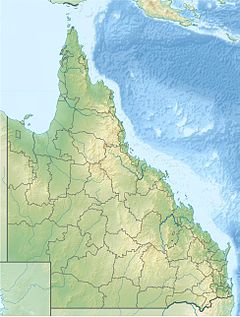Pine River (Queensland)
| Pine River | |
|---|---|
 Dohles Rocks Road at Griffin, 2016 | |
Location of the Pine River mouth in Queensland | |
| Location | |
| Country | Australia |
| State | Queensland |
| Region | South East Queensland |
| Physical characteristics | |
| Source | D'Aguilar Range |
| Source confluence | North and South Pine Rivers |
| • location | Lawnton |
| • coordinates | 27°17′15″S 153°00′57″E / 27.2875°S 153.015833°E |
| • elevation | 11 m (36 ft) |
| Mouth | Bramble Bay, Moreton Bay |
• location | north of Brighton |
• coordinates | 27°16′43″S 153°02′50″E / 27.278681°S 153.04718°E |
• elevation | 0 m (0 ft) |
| Length | 7 km (4.3 mi) |
| Basin features | |
| Tributaries | |
| • right | Bald Hills Creek |
| [1] | |
The Pine River is a river in South East Queensland, Australia.[2] The river is formed by the confluence of the North Pine and the South Pine rivers at Lawnton, continuing into Bramble Bay.[3]
Location and features
[edit]The Pine River carries the city border between the City of Moreton Bay and City of Brisbane along its middle (continuing up the South Pine River). The northern shoreline followsuburbs of Murrumba Downs and Griffin, while the southern shoreline follows Brisbane suburbs of Bald Hills and Brighton. The river descends 11 metres (36 ft) over its 7-kilometre (4.3 mi) course.[1] The Bald Hills Creek feeds into the Pine River which create the Bald Hills Creek and Tinchi Tamba Wetlands Reserve, a large environmental park covering more than 380 hectares (940 acres). The Pine River and Hays Inlet wetland is significant because of its value to wildlife, especially migratory waders.[4] The Pine River is classified as being "extensively modified".[5]
The Pine Rivers Shire draws its name from the Pine, the North Pine and the South Pine rivers.[6]
Flora species
[edit]
- Mangrove species:[citation needed]
- River mangrove (Aegiceras corniculatum)
- Large-fruited orange mangrove (Bruguiera gymnorhiza)
- Yellow mangrove (Ceriops tagal)
- Spotted mangrove (Rhizophora stylosa)
- Milky mangrove (Exoecaria agallocha)
- Black mangrove (Lumnitzera racemosa)
- Eucalypt and mixed woodland species:
- Moreton Bay ash (Corymbia tessellaris)
- Grey ironbark (Eucalyptus paniculata)
- Swamp she-oak (Casuarina glauca)
- White bottlebrush (Callistemon salignus)
- Swamp paperbark (M. quinquenervia)
- Broad-leaved leopard tree (Flindersia collina)
- Cotton tree (Hibiscus tiliaceus)
The predominant land uses in the catchment area are native bush, grazing, rural residential and urban.[7]
Human uses
[edit]Water supply: North Pine Dam[8] North Pine Dam (Lake Samsonvale) is located on the North Pine River. The storage capacity for water supply is 215,000 megalitres (7,600×106 cu ft).[citation needed]
Recreational fishing: Pine River is a popular waterway for recreational fishing. Total estimated recreational catch for Pine River in 1997 was 1,509,755 fish (2.71% of Qld total) from an estimated 141,092 fishing trips (1.31% of Qld total). Estimated catch by top five species were: whiting 351,799, bream 230,598, winter whiting 203,028, diver whiting 190,131, snapper (squire) 127,298. (Data for 1999)[citation needed]
A maximum of ten commercial boats fished Pine River in 1999, for a total catch of 21.9 tonnes (21.6 long tons; 24.1 short tons). Pine River is also used for other water-based recreation, including water skiing and the use of personal watercraft.[citation needed]
See also
[edit]References
[edit]- ^ a b "Map of Pine River, QLD". Bonzle Digital Atlas of Australia. Archived from the original on 16 July 2023. Retrieved 7 October 2015.
- ^ "Pine River – river in City of Moreton Bay (entry 26843)". Queensland Place Names. Queensland Government. Retrieved 12 May 2024.
- ^ "Layers: Locality; Mountains and ranges; Contours; Watercourses". Queensland Globe. Queensland Government. Archived from the original on 19 December 2017. Retrieved 12 May 2024.
- ^ "Australian wetlands database". Australian Government. 2008. Retrieved 15 January 2008.
- ^ "Ozcoasts database". ozcoasts.org.au. 2008. Archived from the original on 5 September 2007. Retrieved 15 January 2008.
- ^ "Pine Rivers Shire". Queensland Places. Centre for the Government of Queensland, University of Queensland. Archived from the original on 7 December 2023. Retrieved 12 May 2024.
- ^ "Pine Rivers Catchment and Estuary (2008)". emph.org. Archived from the original on 3 December 2007. Retrieved 15 January 2008.
- ^ "SEQWater's Dams (2002)". seqwater.com.au. Archived from the original on 9 January 2008. Retrieved 15 January 2008.

